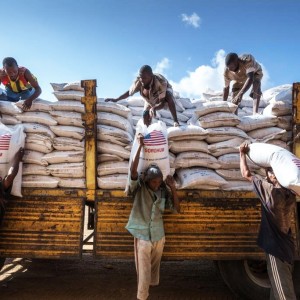The Stream, January 6: El Nino Has Peaked
The Global Rundown |
El Nino, the global phenomenon causing extreme weather from Asia to Africa, has peaked and will likely diminish by the middle of the year. Floods in England last month inundated thousands of properties, and a new report urges the government to tighten restrictions on new buildings in flood-prone areas. Meanwhile, officials in Sri Lanka are encouraging farmers to take advantage of unusually heavy rainfall. The Kumtor gold mine in Kyrgyzstan continues to raise concerns about water pollution and damage to glaciers, but activists say protesting is dangerous. A new report looks at the human cost of China’s massive South-North water transfer project. The governor of Michigan declared a state of emergency in Flint to address the city’s lead-contaminated drinking water.
“Once they extract all the gold at Kumtor, they have to close the project … This is what worries me. What’s going to happen after? What will our descendants have?” –Rustam Atabayev, a resident of Issyk Kul province in Kyrgyzstan, referring to the nearby Kumtor gold mine that is at the center of civic protests. Opponents of the mine fear it is damaging glaciers in the Tian Shan mountains, and that the mine’s tailings ponds could cause water pollution. (Guardian)
By The Numbers |
16,000 properties Number flooded in England by several winter storms in December. It was the country’s wettest December in a century. Guardian
6 floods Number that hit Galella, a village in central Sri Lanka, over the past two months. Disaster risk reduction specialists are urging farmers to take advantage of the unusual rainfall and adapt to changing weather patterns. Reuters
Science, Studies, And Reports |
The El Nino weather phenomenon, caused by warmer than normal water temperatures in the equatorial Pacific, has peaked, according to the Australia Bureau of Meteorology. The current El Nino has triggered severe droughts in Ethiopia, Central America, and Papua New Guinea. Conditions are expected to return to normal by the second quarter of the year. Reuters
Homes and businesses continue to be built in low-lying areas despite the risk to life and property posed by floods, according to a report released by the Centre for Economic Performance at the London School of Economics and Political Science. To combat the problem, the report urges governments to tighten regulations on new buildings in flood-prone areas. Bloomberg
On The Radar |
China’s massive South-North water transfer project began delivering water to cities in the country’s dry north at the end of 2014. A new multimedia project examines the human cost of the megaproject from the Danjiangkou reservoir to Beijing. ChinaFile; Pulitzer Center on Crisis Reporting
Michigan Governor Rick Snyder declared a state of emergency in the city of Flint, channeling state resources to the city and opening the door to possible federal assistance. Flint is struggling to address lead contamination in its drinking water caused by a temporary switch to an alternate water source in 2014. Associated Press
A news correspondent for Circle of Blue based out of Hawaii. She writes The Stream, Circle of Blue’s daily digest of international water news trends. Her interests include food security, ecology and the Great Lakes.
Contact Codi Kozacek







Leave a Reply
Want to join the discussion?Feel free to contribute!